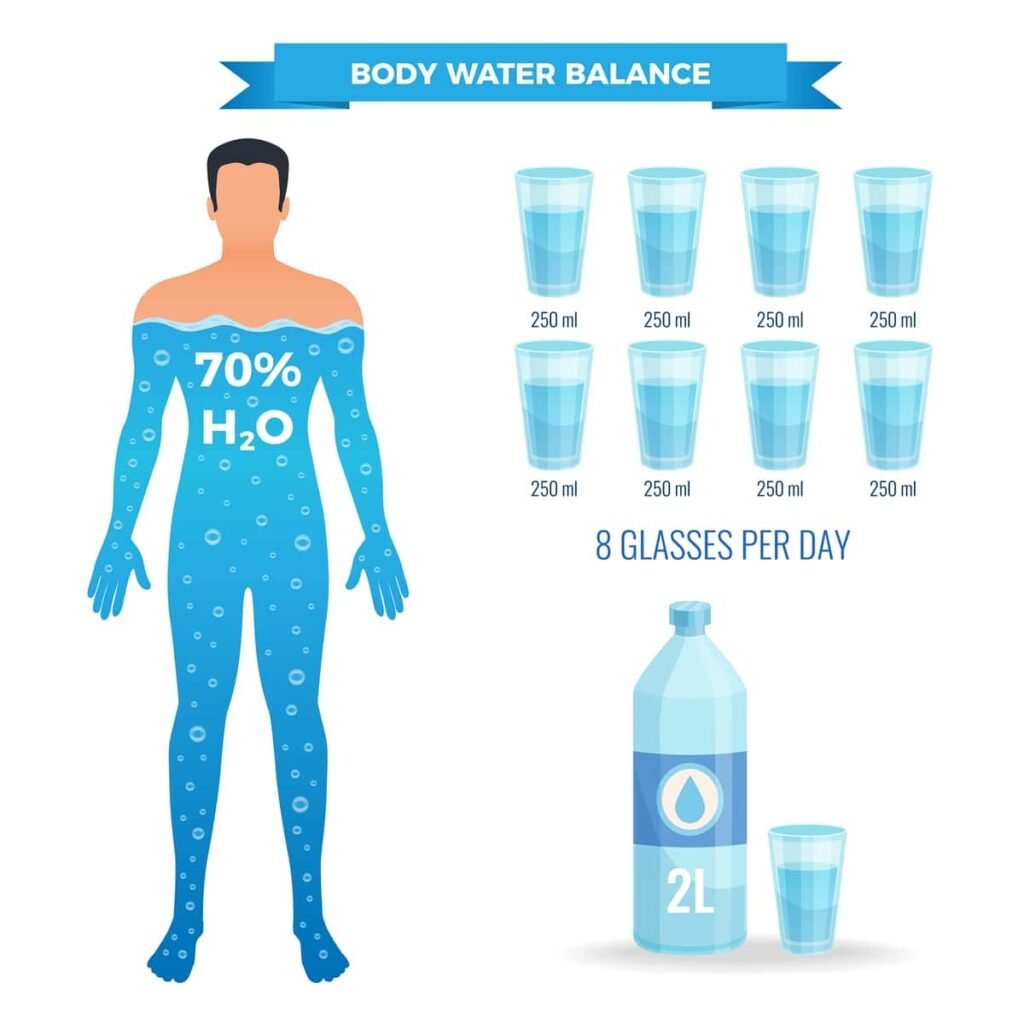Here, we are going to discuss 16 Science-Based Health Benefits of Drinking Water: A Deep Dive into Hydration
Water. It’s the lifeblood of our planet and the essential ingredient for human survival. Yet, despite its importance, many of us don’t drink enough. Beyond simply quenching thirst, adequate water intake offers a plethora of scientifically proven health benefits. This blog post delves into 16 of these benefits, providing you with a comprehensive understanding of why staying hydrated is crucial for your overall well-being.
Health Benefits of Drinking Water

Why Water is So Important
Before we dive into the benefits, let’s quickly recap why water is so vital. Our bodies are composed of about 55-78% water, depending on age and body composition. Water is involved in nearly every bodily function, including:

- Transportation: It carries nutrients and oxygen to cells and removes waste products.
- Regulation: It helps regulate body temperature, electrolyte balance, and blood pressure.
- Lubrication: It lubricates joints and organs, preventing friction and damage.
- Protection: It cushions and protects the brain, spinal cord, and other sensitive tissues.
With that in mind, let’s explore the 16 science-backed reasons why you should prioritize drinking enough water:
1. Enhanced Physical Performance
Dehydration can significantly impact physical performance. Even mild dehydration (as little as 1-2% fluid loss) can impair athletic performance, reduce endurance, and increase perceived exertion.
- The Science: Studies have shown that dehydration leads to reduced blood volume, decreased oxygen delivery to muscles, and increased heart rate during exercise. These factors contribute to fatigue and reduced performance.
- Takeaway: Staying adequately hydrated before, during, and after physical activity is crucial for optimizing performance and preventing injuries. Aim to drink water regularly throughout your workout, especially during prolonged or intense sessions.
2. Improved Cognitive Function
Our brains are particularly sensitive to dehydration. Even mild dehydration can negatively impact cognitive function, affecting concentration, memory, and mood.
- The Science: Research suggests that dehydration can disrupt brain cell activity and neurotransmitter function. Studies have shown that dehydrated individuals perform worse on cognitive tasks requiring attention, memory, and reasoning.
- Takeaway: Keep a water bottle handy and sip on it throughout the day to maintain optimal cognitive function and mental clarity. This is especially important during demanding tasks or when you need to stay focused for extended periods.
3. Headache Prevention and Relief
Dehydration is a common trigger for headaches, including tension headaches and migraines.
- The Science: Dehydration can cause blood vessels in the brain to constrict, leading to pain and discomfort. Research has shown that drinking water can help relieve headaches in some individuals, especially those caused by dehydration.
- Takeaway: If you frequently experience headaches, ensure you’re drinking enough water. Sometimes, simply rehydrating can alleviate the pain.
4. Healthy Digestion
Water is essential for proper digestion. It helps break down food, absorb nutrients, and move waste through the digestive tract.
- The Science: Dehydration can lead to constipation as the body absorbs more water from the stool, making it harder to pass. Adequate water intake helps soften stools and prevent constipation. Furthermore, water is needed for the production of stomach acid, which is vital for food digestion.
- Takeaway: Drink plenty of water throughout the day to support healthy digestion and prevent constipation. Consider starting your day with a glass of water to kickstart your digestive system.
5. Weight Management
Drinking water can aid in weight management in several ways.
- The Science:
- Increased Satiety: Water can help you feel fuller, leading to reduced calorie intake. Drinking water before meals can be a simple and effective strategy for weight loss.
- Boosted Metabolism: Some studies suggest that drinking water can temporarily increase metabolism.
- Reduced Calorie Intake from Beverages: Replacing sugary drinks with water can significantly reduce your calorie intake.
- Takeaway: Incorporate water into your weight management strategy. Drink water before meals, replace sugary drinks with water, and stay hydrated throughout the day.
6. Healthy Skin
While not a magic cure for wrinkles, water plays a vital role in maintaining healthy skin.
- The Science: Water helps keep skin cells hydrated, making them appear plumper and more radiant. Dehydration can lead to dry, flaky skin and can exacerbate conditions like eczema and psoriasis. Water helps deliver essential nutrients to skin cells and flush out toxins.
- Takeaway: Staying hydrated can improve skin elasticity and overall appearance. Combine adequate water intake with a healthy skincare routine for optimal results.
7. Kidney Health
The kidneys filter waste products from the blood and excrete them in urine. Water is crucial for this process.
- The Science: Adequate water intake helps prevent kidney stones by diluting urine and reducing the concentration of minerals that can form stones. It also helps prevent urinary tract infections (UTIs) by flushing out bacteria from the urinary tract.
- Takeaway: Drink plenty of water to support kidney function and prevent kidney stones and UTIs. Individuals with a history of kidney stones or UTIs should pay particular attention to their water intake.
8. Improved Mood
Even mild dehydration can negatively impact mood.
- The Science: Studies have shown that dehydration can lead to increased feelings of anxiety, irritability, and fatigue. This is likely due to the impact of dehydration on brain function and neurotransmitter activity.
- Takeaway: Ensure you’re staying hydrated to maintain a positive mood and reduce feelings of anxiety and irritability.
9. Detoxification
Water helps flush out toxins and waste products from the body through urine and sweat.
- The Science: The kidneys and liver rely on water to filter and eliminate toxins from the blood. Adequate water intake supports these organs in their detoxification efforts.
- Takeaway: Staying hydrated supports the body’s natural detoxification processes.
10. Regulation of Body Temperature
Water plays a crucial role in regulating body temperature through sweating.
- The Science: When we overheat, our bodies release sweat, which evaporates from the skin and cools us down. Water is the primary component of sweat. Dehydration can impair the body’s ability to regulate temperature, leading to overheating and heatstroke.
- Takeaway: Drink plenty of water, especially during hot weather or physical activity, to prevent overheating and maintain a stable body temperature.
11. Joint Health
Water helps lubricate joints and reduce friction, contributing to joint health and mobility.
- The Science: Cartilage, the tissue that cushions joints, is made up of about 80% water. Dehydration can reduce cartilage volume and increase joint pain.
- Takeaway: Stay hydrated to support joint health and reduce joint pain.
12. Heart Health
Dehydration can put a strain on the cardiovascular system.
- The Science: Dehydration can lead to decreased blood volume, which forces the heart to work harder to pump blood throughout the body. Chronic dehydration can increase the risk of heart disease.
- Takeaway: Adequate water intake is essential for maintaining healthy blood volume and supporting cardiovascular function.
13. Saliva Production
Water is the main component of saliva, which is essential for oral hygiene and digestion.
- The Science: Saliva helps moisten food, making it easier to swallow and digest. It also contains enzymes that break down food and help protect teeth from decay. Dehydration can lead to decreased saliva production, resulting in dry mouth and increased risk of dental problems.
- Takeaway: Stay hydrated to maintain adequate saliva production and support oral health.
14. Nutrient Absorption
Water is essential for the absorption of nutrients from food.
- The Science: Water helps dissolve nutrients and transport them from the digestive tract to the bloodstream. Dehydration can impair nutrient absorption, leading to nutritional deficiencies.
- Takeaway: Drink plenty of water to ensure proper nutrient absorption and prevent deficiencies.
15. Immune System Support
Water is important for a healthy immune system.
- The Science: Water helps flush out toxins and waste products that can compromise immune function. It also helps maintain healthy mucus membranes, which act as a barrier against infection. Dehydration can weaken the immune system, making you more susceptible to illness.
- Takeaway: Stay hydrated to support a healthy immune system and protect yourself from illness.
16. Healthy Cell Function
Water is essential for all cellular processes.
- The Science: Water is the medium in which all biochemical reactions occur within cells. It is essential for maintaining cell structure and function. Dehydration can impair cell function and lead to various health problems.
- Takeaway: Adequate water intake is fundamental for healthy cell function and overall health.
How Much Water Do You Need?
While the “8 glasses a day” rule is a good starting point, individual water needs can vary based on factors such as activity level, climate, diet, and overall health. A more personalized approach considers these factors.
- Listen to your body: Thirst is a sign that you’re already dehydrated. Don’t wait until you’re thirsty to drink.
- Monitor your urine: Aim for pale yellow urine. Dark yellow urine is a sign of dehydration.
- Consider your activity level: If you’re active, you’ll need more water to replace fluids lost through sweat.
- Pay attention to the climate: Hot weather can increase fluid loss through sweat.
- Adjust for health conditions: Certain medical conditions may require you to drink more or less water. Consult with your doctor for personalized recommendations.
Tips for Staying Hydrated:

- Keep a water bottle with you: Make it easy to access water throughout the day.
- Set reminders to drink water: Use your phone or a water tracking app.
- Drink water before, during, and after exercise: Replenish fluids lost through sweat.
- Eat water-rich foods: Fruits and vegetables like watermelon, cucumber, and spinach are excellent sources of water.
- Infuse your water with fruits and herbs: Add flavor to make water more appealing.
- Replace sugary drinks with water: Cut down on empty calories and stay hydrated.
Conclusion:
The science is clear: water is essential for our health and well-being. From boosting physical and cognitive performance to supporting kidney function and preventing headaches, the benefits of staying hydrated are numerous and far-reaching. Make water a priority in your daily routine and reap the rewards of a healthier, more vibrant life. Remember to listen to your body, adjust your intake based on your individual needs, and make hydration a habit for long-term health.
Also Read,


